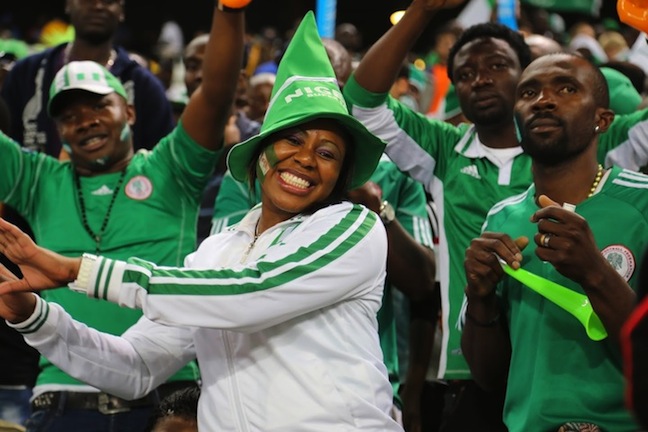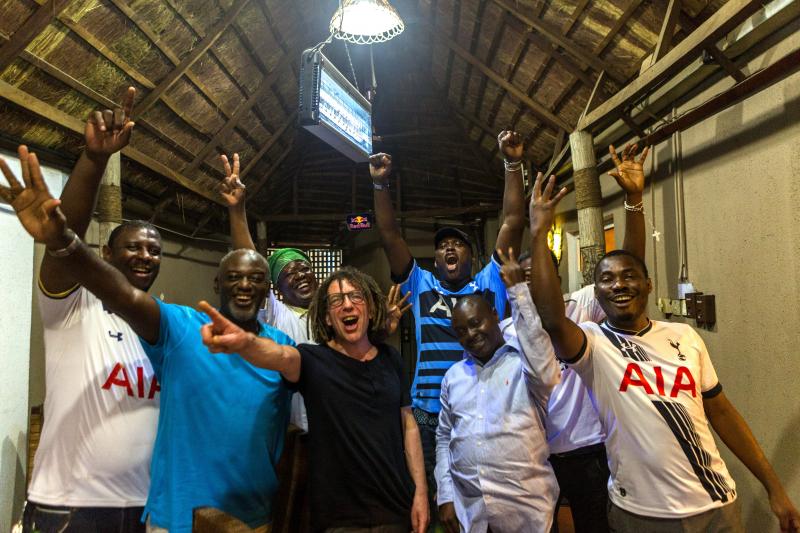
The English Premier League is an obsession for millions of African fans. Author and fútbologist David Goldblatt recently traveled to Lagos, Nigeria, to find out what this cultural phenomenon looks like and why there is such deep reverence for Arsenal, Manchester United, Chelsea, Spurs, and . . . Bournemouth.
In a newly released piece for Bleacher Report, Goldblatt hears from Emeka Onyenufuro, founder of Arsenal Nigeria, who tells him that “Monday to Friday lunchtime, I’m working in my job [as a manager in the power industry], but from Friday afternoon to Monday morning, it is all Arsenal.”
The quality of EPL play and the excitement of watching some of the world’s best players, including N’Golo Kanté, Victor Moses, Yaya Touré, and many other African superstars, partly explains the intensity of local passion for and dedication to the EPL. But another explanation is that the middle-class Nigerian men at the heart of this piece have willingly capitulated to the EPL’s “attention merchants” (Tim Wu docet): “It’s the branding. . . it’s just so professional,” a fan explains.
The author takes us into various public viewing spaces where the South African-owned satellite provider DSTV beams in live games, highlights, and talk shows that collectively stoke the obsessive compulsions of the Nigerian EPL fan. When not watching matches (and praying that frequent power cuts don’t ruin crucial moments in the broadcast), the lads follow their favorite clubs on social media for several hours a day.
The piece also features a fascinating description of the Socialiga, a football and basketball league and “social space to network with their peers, flirt and raise some money for charity.” It left me wanting to know even more about this astonishing kind of grassroots social entrepreneurship.
The Nigerian photographer Andrew Esiebo’s images complement the prose quite beautifully. And Esiebo’s camera does not lie: David Godlblatt seemed most at home in Lagos among his Spurs Nation mates (see photo above).
Read the full article here.
Tag: Nigeria
African Footballers in Sweden: A Review
I chatted about the 2014 World Cup with Assumpta Oturu on KPFK Pacifica Radio‘s Spotlight Africa program.
We analyzed Brazil’s historic collapse, Germany’s youth development policies, club versus country loyalties, African teams’ performances and what can be done to improve their results in global football.
Listen to the entire July 19, 2014, show here.
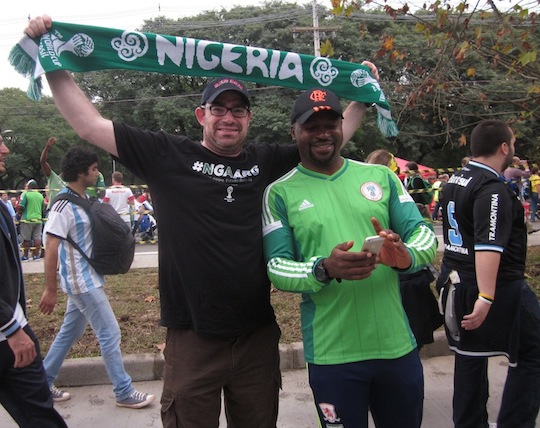
Guest Post by *Derek Charles Catsam
I recently returned from the 2014 World Cup in Brazil. It was a remarkable experience in a beautiful country. Everywhere we went people were gracious, joyful hosts. We ate fantastic churrasqueira (the Brazilian barbecue that will fuel my dreams for months) and drank among friends. The games were tremendous, the colorful visiting fans (with special mention to the dancing, chanting, singing, drinking Argentine throngs) made the World Cup the event that it is. The protests were more intermittent than expected. But the issues raised were as valid as ever.
I was based in Porto Alegre in the state of Rio Grande do Sul on Brazil’s southern border with Uruguay and Argentina. I attended four matches in Estadio Beria-Rio, the home of Sports Club Internacional: France-Honduras, Algeria-South Korea, Argentina-Nigeria, and the round of 16 match pitting eventual champions Germany against the Algeria. With 32 teams competing, the first two weeks of the World Cup are an unparalleled Carnival of Nations. Porto Alegre was in the midst of a Brazilian winter, hardly freezing, but occasionally raw and damp. The bikinis and swimming shorts that many of you saw as the regular going-to-commercial interludes on ESPN were many hundreds of miles north.
The tournament, which equaled the most goals (171) ever scored in a World Cup, was spectacularly entertaining and Germany is certainly a worthy champion. But once the confetti cleared, the last drinks were downed, tourists returned home, and Brazilians shook off the shameful way the Seleção flamed out of the tournament (and I do not for one second believe that the presence of Thiago Silva and Neymar against Germany and the Netherlands would have made much difference—Brazil’s problems were systemic) a familiar question looms: Was hosting the World Cup worth it?
World Cup Music: “Afri Can”
An antidote to Shakira and Pitbull!
“Afri Can” is a charity single by Replay GH, a Ghana-based group featuring Zed Ay Kay (Replay GH), Fuji, Farid, and Gustav. It brings together influence from the five African countries that have qualified for the Brazil 2014 World Cup: Ghana, Nigeria, Cameroon, Algeria, and Ivory Coast.
According to the artists, “the different influences, and styles are seamlessly woven together to produce a modern Afro Beats song for the enjoyment of all football and music fans.” To find out more about Afri Can, visit: http://www.outofafricacampaign.com/afri-can/
Photo courtesy of Chris Bolsmann
The Big Boss Man of Nigeria’s Super Eagles, Stephen Keshi, transformed perennial underachievers of the African game into continental champions in the recent African Nations Cup in South Africa.
Keshi weeded out huge egos. He selected players based on ability, merit, and, most important, attitude. He imposed strict curfews on a team brimming with young players of limited experience drawn from Nigerian clubs rather than European ones. Thanks to his steady leadership, the Super Eagles defied the prognostications of pundits and fans alike in claiming their third African title.
Keshi knows how to win. He wore the captain’s armband in Nigeria’s previous Nations Cup triumph in 1994 against Zambia. The captain of the opposing side in that final in Tunis was Kalusha Bwalya, who played an important role in masterminding Chipolopolo’s 2012 championship run. “King Kalu,” currently Zambian Football Association president, saw to it that the nucleus of that winning Chipolopolo side stuck together for more than five years. Big Boss Keshi, on the other hand, overcame a perennial African problem by selecting a team based on what they can do, and what they are willing to do for the collective, instead of which European team they play for. In orchestrating their respective countries’ African triumphs, Bwalya and Keshi merely implemented a philosophy rarely found in most parts of African football: common sense.
The enduring lesson from Nigeria’s 2013 Nations Cup victory is that having so-called big names in your team is less than important than unity and a desire to win. As I have argued before, it is this generation of African football luminaries that must ensure that our football realizes its potential. When Keshi quit his job immediately after winning the title he cast light on the mediocrity of Nigerian football administration. (His resignation has since been withdrawn. Click here and here for more details.) The sight of South African Football Association president Kirsten Nemantandani looking bamboozled, insipid, and nervous when tasked with ceremoniously passing the CAF flag to Issa Hayatou is another reminder of why African football management should be the prerogative of competent, visionary people; not motley crews of myopic sorts whose organizations find themselves in the midst of FIFA match-fixing investigations.
Witnessing Slim Jedidi’s farcical refereeing in the Ghana-Burkina Faso semifinal, a fellow brother of mine noted: “Success in Africa is never rewarded because merit is hated. Why? Because the Big Men are there by fraud and manipulation.” Thank you to runners-up Burkina Faso and to Stephen Keshi for demonstrating how African football can soar above the deeds of those who always try to bring us backwards. May it continue in that trajectory.
Nigeria’s Triumph, Africa’s Tournament
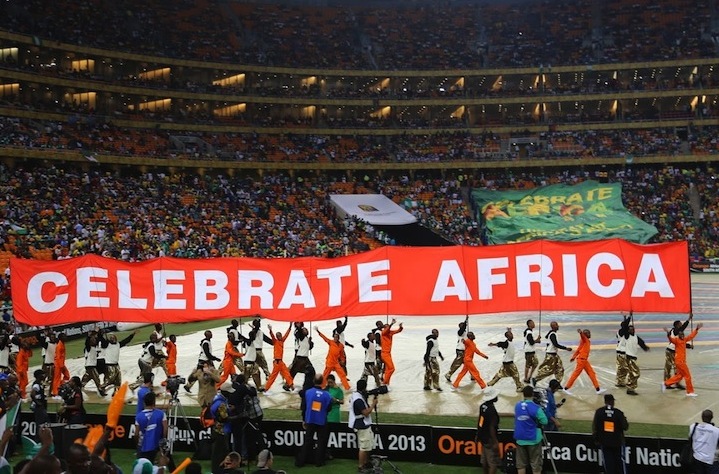
Photos courtesy of Chris Bolsmann
By Chris Bolsmann (@ChrisBolsmann) and Marc Fletcher (@MarcFletcher1)
February 11, 2013 (23rd anniversary of Mandela’s release from prison.)
JOHANNESBURG, SOUTH AFRICA
Chris Bolsmann (CB): In February 1996, I celebrated with 100,000 other delirious South Africans packed into Soccer City after we beat Tunisia in the African Nations Cup final. It was a special victory and an important moment in South African sports history. It was more special that the 1995 rugby World Cup win because the soccer crown was won by a genuinely racially integrated team playing the game obsessively followed by most South Africans. 1996 has remained a very powerful memory for me over the last 17 years. However, there has always been one lingering doubt in the back of my mind: Nigeria, the reigning African champions at the time, did not participate.
The Nigerian junta’s sham trial and execution in November 1995 of author and environmental activist Ken Saro-Wiwa drew a sharp rebuke from then-South African President Nelson Mandela. Relations between the two countries quickly deteriorated and led to the reigning champions’ withdrawal from the 1996 tournament in South Africa. These events intensified the heated rivalry between South Africa and Nigeria. For Sunday’s final I had planned to support Burkina Faso. The Burkinabé had reached their first-ever Nations Cup final by playing exciting and entertaining football; they were also the under-dogs.
Marc Fletcher (MF): I arrived at Soccer City’s National Stadium almost four hours before Sunday’s kickoff and was pleased to see that the Nations Cup party atmosphere had finally hit Johannesburg. Considering the large Nigerian population in the city, it was unsurprising that the vast majority of the fans streaming in were Super Eagles supporters. More surprising was the significant number of South Africans choosing to support Nigeria. After all, “Nigerians” here are perceived as illegal immigrants and dangerous criminals. Tensions between African immigrant communities and South Africans have sometimes spilled over into xenophobic attacks, as in the deadly riots of 2008. But the Nations Cup final appeared to turn this association upside down; being Nigerian, or identifying with Nigeria, had become a positive thing, if only temporarily.
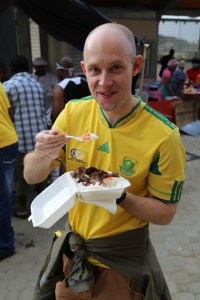 Walking towards the spectacular stadium, it was also apparent how this experience differed from the World Cup I attended almost three years before. Back then, football fans had been promised an “African” World Cup (whatever that entailed). South Africans and tourists alike had been repeatedly told that “It’s Africa’s Turn” and that South Africa would show the world the positives Africa had to offer. Instead, a bland, commercialised FIFA-controlled environment reduced the local flavour of the tournament to the controversy surrounding vuvuzelas. As one of my local research informants summarised, “this could be anywhere!”
Walking towards the spectacular stadium, it was also apparent how this experience differed from the World Cup I attended almost three years before. Back then, football fans had been promised an “African” World Cup (whatever that entailed). South Africans and tourists alike had been repeatedly told that “It’s Africa’s Turn” and that South Africa would show the world the positives Africa had to offer. Instead, a bland, commercialised FIFA-controlled environment reduced the local flavour of the tournament to the controversy surrounding vuvuzelas. As one of my local research informants summarised, “this could be anywhere!”
But 2013 was different. Cheaper tickets must have been a factor, allowing those who could not attend World Cup matches to engage, to experience and to celebrate. The bland hot dogs of the World Cup had been replaced with the pap and steak and boerwors rolls, staple foods at domestic matches. The relentless drumming from the small group of Burkinabé in the seats near me infused the tournament with the beat that had been lacking nearly three years ago. People of different racial, ethnic, class, and gender backgrounds socialised with one another–a dream for Rainbow Nation proponents–while the vast panoply of different African football shirts and flags reinforced a wider belonging to “Africa.” Security checks on spectators were inconsistent at best. A feeble, half-hearted pat down from a steward would do little to detect things such as flares, which constantly happens at local games (my favourite is still seeing someone pull out a full bottle of whiskey from his sock!). The pitch resembled a beach with players kicking up clouds of sand constantly. When Nigeria went ahead through Sunday Mba’s brilliant goal three-quarters of the stadium erupted in celebration. A far cry from the World Cup.
CB: Our tickets for the final were purchased months in advance, but as we tried to get to our seats it was clear that Nigerian fans occupied this part of the stadium. After stern words and persistence, we finally sat in our seats. It took stadium security and the South African police a good thirty minutes of the first half to move Nigerian fans seated on the stairs next to us to proper seats. I chatted to Sunday, a Nigerian national who told me he currently lives in Germiston on the East Rand (part of greater Johannesburg). Directly behind us was a group of eight or so trumpeters and a couple of drummers who played throughout the match. It was hard not to sway and dance to the fantastic music. By the time Nigeria took the lead my fickle allegiance was swaying towards the Super Eagles. When the final whistle blew I was happy Nigeria had won their third African title and had done so on South African soil. I look forward to Nigeria representing Africa at the Confederations Cup in Brazil later this year. But even more exciting is the prospect of South Africa regaining the lofty heights of 1996 and a show down with Nigeria. Despite Bafana’s quarterfinal exit, I carry on believing.
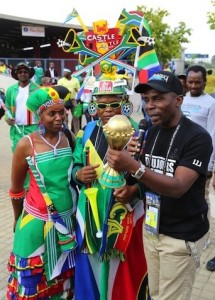 MF: I’ve fallen into the trap of comparing a westernised, modern, slick, commercialised World Cup with the chaotic yet dynamic African tournament. I’m not sure how to extricate myself from this other than to continue digging my hole with my romanticism of the final. It was a vibrant celebration of African football. Yet, as I drove to work this morning, the newspaper headlines attached to most Jo’burg streetlights were not about the final but Manchester United extending their lead at the top of the English Premier League. Is the 2013 Africa Cup of Nations already being forgotten?
MF: I’ve fallen into the trap of comparing a westernised, modern, slick, commercialised World Cup with the chaotic yet dynamic African tournament. I’m not sure how to extricate myself from this other than to continue digging my hole with my romanticism of the final. It was a vibrant celebration of African football. Yet, as I drove to work this morning, the newspaper headlines attached to most Jo’burg streetlights were not about the final but Manchester United extending their lead at the top of the English Premier League. Is the 2013 Africa Cup of Nations already being forgotten?
